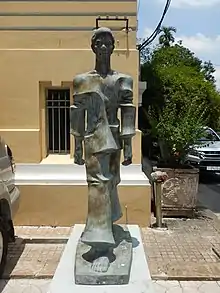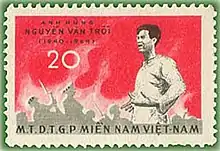Nguyễn Văn Trỗi | |
|---|---|
 Nguyễn Văn Trỗi moments before being shot | |
| Born | 1 February 1940 Quảng Nam, Annam, French Indochina |
| Died | 15 October 1964 (aged 24) |
| Cause of death | Execution by firing squad |
| Criminal status | Executed |
| Conviction(s) | Attempted murder |
| Criminal penalty | Death |
Nguyễn Văn Trỗi (1 February 1940[1] – 15 October 1964) was a Vietnamese revolutionary and member of the Việt Cộng (National Liberation Front). He gained notoriety after being captured by South Vietnamese forces while trying to assassinate United States Secretary of Defense Robert McNamara and Ambassador Henry Cabot Lodge Jr. who were visiting South Vietnam in May 1964.[2]
Sentence and execution
In May 1964 Viet Cong forces planned to assassinate McNamara and Lodge by blowing up the Cong Ly Bridge (10°47′28″N 106°40′55″E / 10.791°N 106.682°E) as their motorcade passed over the bridge. Trỗi was captured by South Vietnamese forces.[3]: 365
Sentenced to death, Trỗi got a brief reprieve after the FALN, a Venezuelan communist guerrilla group, kidnapped United States Air Force Lieutenant Colonel Michael Smolen in revenge for Trỗi's sentence. The group threatened to kill Smolen if Trỗi was executed. Smolen was eventually released unharmed, and Trỗi was shot by firing squad shortly thereafter in Chí Hòa Prison.[4]
Trỗi became the first publicly executed member of the Viet Cong.[5] His execution was filmed, and he remained defiant to the end. His last words before his execution in Saigon to correspondents were
You are journalists and so you must be well informed about what is happening. It is the Americans who have committed aggression on our country, it is they who have been killing our people with planes and bombs ... I have never acted against the will of my people. It is against the Americans that I have taken action.
When a priest offered him absolution, he refused, saying: "I have committed no sin. It is the Americans who have sinned." As the first shots were fired, he called out, "Long live Vietnam!"[2]
Legacy


In the West, Trỗi's arrest went largely unreported in the mainstream; indeed, major news media did not report on Trỗi at all until the FALN kidnapping episode.[6] His anonymity persisted after his execution, despite the honors heaped upon him in Communist countries. Apart from advocacy by revolutionaries like the Weather Underground,[7] and a brief mention in Abbie Hoffman's Steal This Book (1971) as a "Vietnamese hero",[8] Trỗi is still rarely acknowledged in Western accounts of the Vietnam War.
Trỗi was glorified by the Việt Cộng and North Vietnam as a martyr. The first notable act of recognition was in 1965 when the DRVN issued a postage stamp, illustrated on the right, bearing a portrait of him.[9] Considered an exemplar, Trỗi has his name bestowed upon a large school, the Lycée Nguyễn Văn Trỗi in Nha Trang, and a national academic award, The Nguyễn Văn Trỗi Prize.

Many cities in Vietnam have named major streets after him.[10] In Hồ Chí Minh City, the major road upon which McNamara traveled—and where Trỗi planned to assassinate him—is named Nguyen Van Troi Boulevard and a memorial park, the Bia tưởng niệm Anh Hung Liet Si Nguyễn Văn Trỗi is located near the former Cong Ly Bridge.[3]: 365 In Đà Nẵng, the Nguyễn Văn Trỗi Bridge spans the Hàn River. Other countries have commemorated Trỗi, particularly Cuba. where a 14,000-seat public stadium in Guantánamo is named Nguyen Van Troi Stadium, and his statue overlooks Nguyen Van Troi Park in Havana; the city also has a school and a hospital named for him.
Anti-war activists Jane Fonda and Tom Hayden named their son, an actor now known as Troy Garity, in honor of Trỗi.[11]
The 1975 film Chronicle of a Latin American subversive (Spanish: Crónica de un subversivo latinoamericano) by director Mauricio Walerstein, narrates the kidnapping episode of Colonel Smolen (portrayed as Colonel Robert Whitney by actor Claudio Brook) by FALN guerrillas in response to Trỗi's death sentence.[12][13][14]
Biography
Trỗi's widow, Phan Thi Quyen, authored the 1965 book Nguyễn Văn Trỗi As He Was.[15]
References
- ↑ Staff report (16 October 1964). "Another Nasty Stunt." Time (only available online for subscribers). The article describes Trỗi as aged 17 at the time of his execution, although other sources cite 1940 as his year of birth, making him 24 years old at death, which may be more likely given he was married at the time of his death, although the exact year or date of his birth may never be known.
- 1 2 Greene, Felix Greene (1966). Vietnam! Vietnam! In photographs and text. Palo Alto, California: Fulton Publishing Company, LCCN 66-28359
- 1 2 Doling, Tim (2019). Exploring Saigon-Cholon – Vanishing Heritage of Ho Cho Minh City. Thế Giới Publishers. ISBN 9786047761388.
- ↑ Staff report. (23 October 1964). "Suggestions, Anyone?" Time
- ↑ Reuters (15 October 1964). "Saigon Executes Youth For Plot on McNamara". The New York Times
- ↑ e.g. See The New York Times, 1963–64.
- ↑ Grathwohl, Larry, and Reagan, Frank (1976). Bringing Down America: An FBI Informer with the Weathermen. Arlington House, New Rochelle, NY, page 39.
- ↑ Hoffman, Abbie (1995). Steal This Book. Four Walls Eight Windows. p. 71.
- ↑ The New York Times (19 May 1968). "Postal Issues of North Vietnam".
- ↑ Vietnam Country Map. Periplus Travel Maps. March 2002. ISBN 0-7946-0070-0.
- ↑ "The heart doesn't grow Fonda" by Mark Steyn, The Telegraph, 3 January 1998.
- ↑ Cronica-de-un-Subversivo-Latino-Americano – Trailer – Cast – Showtimes – NYTimes.com
- ↑ Crónica de un subversivo latinoamericano (1975) – IMDb
- ↑ Crónica de un subversivo latinoamericano (Chronicle of a Latin American Subversive) (1975) – Rotten Tomatoes
- ↑ Phan Thi Quyen (c. 1965) Nguyen van troi tel qu'il etait (edited by Trần Đình Văn). Hanoi: Editions en langues etrangeres; F8HG.4/P535T